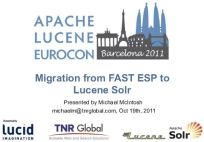“Lucid’s products expand upon open source tools to offer many additional features and extensive support on their product line” said Michael McIntosh, VP of Search Technologies for TNR
Late last April 2012, TNR Global entered into a strategic relationship with California’s Lucid Imagination. One of the many benefits to this alliance is that in addition to the integration services TNR has historically offered, clients now can obtain enterprise class search platforms designed by Lucid Imagination and integrated by TNR Global’s search team. “Lucid’s products expand upon open source tools to offer many additional features and extensive support on their product line” said Michael McIntosh, VP of Search Technologies for TNR. “Lucid’s product offerings are solid and they have a range of options that we can now offer by way of our relationship with them. They round out our services and solutions very nicely.” Details on Lucid Imagination’s enterprise class search platform can be viewed at Lucid Imagination’s website.
TNR still provides customized integration for search including Lucene Solr as well as other open source and commercial products. “When a client approaches us with a problem they need solved, we always look at what they need most out of a solution. During our evaluation period, we look at a number of factors. One solution doesn’t always do the trick–we always suggest what is best for the client based on their particular circumstance.” This strategy allows TNR to offer a range of solutions, including support. “Now that we are in a relationship with Lucid, we have even more options–and having choices is good for our clients.” said Karen Lynn, Director of Business Development.
TNR Global (TNR) is a systems design and integration company focused on enterprise search and cloud computing solutions. TNR develops scalable web-based search solutions focusing on companies and organizations in the following industries: News Sites, Publishing, Web Directories, Information Portals, Web Catalogs, Education, Manufacturing and Distribution, Customer Service, and Life Sciences. For more information, please visit: www.tnrglobal.com
About Lucid Imagination
Lucid Imagination is the only company that delivers an enterprise-grade search development platform built on the power of Apache Lucene/Solr open source search. Out of the 35 Core Committers to the Apache Lucene/Solr project, 9 individuals work for Lucid Imagination, making the company the largest supporter of open source search in the industry. Customers include AT&T, Sears, Ford, Verizon, Cisco, Zappos, Raytheon, The Guardian, The Smithsonian Institution, Salesforce.com, The Motley Fool, Qualcomm, Taser, eHarmony and many other household names around the world. Lucid Imagination investors include Shasta Ventures, Granite Ventures, Walden International, and In-Q-Tel. Learn more about the company at www.lucidimagination.com
###
For more information on this topic or to schedule an interview, please contact Karen E. Lynn at 413-425-1499 or email at Karen@tnrglobal.com
Late last April 2012, TNR Global entered into a strategic relationship with California’s Lucid Imagination. One of the many benefits to this alliance is that in addition to the integration services TNR has historically offered, clients now can obtain enterprise class search platforms designed by Lucid Imagination and integrated by TNR Global’s search team. “Lucid’s products expand upon open source tools to offer many additional features and extensive support on their product line” said Michael McIntosh, VP of Search Technologies for TNR. “Lucid’s product offerings are solid and they have a range of options that we can now offer by way of our relationship with them. They round out our services and solutions very nicely.” Details on Lucid Imagination’s enterprise class search platform can be viewed at Lucid Imagination’s website.
TNR still provides customized integration for search including Lucene Solr as well as other open source and commercial products. “When a client approaches us with a problem they need solved, we always look at what they need most out of a solution. During our evaluation period, we look at a number of factors. One solution doesn’t always do the trick–we always suggest what is best for the client based on their particular circumstance.” This strategy allows TNR to offer a range of solutions, including support. “Now that we are in a relationship with Lucid, we have even more options–and having choices is good for our clients.” said Karen Lynn, Director of Business Development.
TNR Global (TNR) is a systems design and integration company focused on enterprise search and cloud computing solutions. TNR develops scalable web-based search solutions focusing on companies and organizations in the following industries: News Sites, Publishing, Web Directories, Information Portals, Web Catalogs, Education, Manufacturing and Distribution, Customer Service, and Life Sciences. For more information, please visit: www.tnrglobal.com
About Lucid Imagination
Lucid Imagination is the only company that delivers an enterprise-grade search development platform built on the power of Apache Lucene/Solr open source search. Out of the 35 Core Committers to the Apache Lucene/Solr project, 9 individuals work for Lucid Imagination, making the company the largest supporter of open source search in the industry. Customers include AT&T, Sears, Ford, Verizon, Cisco, Zappos, Raytheon, The Guardian, The Smithsonian Institution, Salesforce.com, The Motley Fool, Qualcomm, Taser, eHarmony and many other household names around the world. Lucid Imagination investors include Shasta Ventures, Granite Ventures, Walden International, and In-Q-Tel. Learn more about the company at www.lucidimagination.com
###
For more information on this topic or to schedule an interview, please contact Karen E. Lynn at 413-425-1499 or email at Karen@tnrglobal.com

